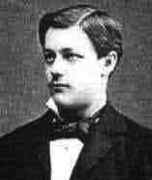Person: Stäckel, Paul

Paul Stäckel was a German mathematician who worked on differential geometry, number theory and non-Euclidean geometry.
Mathematical Profile (Excerpt):
- Marie Stäckel died early in her son's life.
- Ernst Stäckel was the head of a secondary school for girls in the city, as well as being a school inspector, so he clearly knew the value of education and wanted the best for his son.
- Stäckel applied himself well at school, though he seems to have had no particular inclination for mathematics until his seventh year.
- This was the background against which Stäckel lived, the balance only being disturbed late on in his life by the outbreak of World War I.
- However, this was far in the future as Stäckel left school and set off on his chosen career path.
- Having chosen to undertake further study, Stäckel entered the University of Berlin and attended lectures, primarily in mathematics and physics, but also some in philosophy, psychology, history and educational theory.
- As a student, Stäckel did not go unnoticed, his tutors soon recognising both his talent and his diligence.
- Stäckel became a member of the university Mathematische Verein, a mathematical society for interested students to meet and discuss the latest developments in the subject.
- Stäckel completed his degree in 1884 and gained his PhD a year later with a thesis entitled The Motion of a Particle Across a Surface which was inspired by the work of, among others, Euler, Lagrange and Jacobi.
- At this point, Stäckel's intention was to become a teacher, so in 1886 he took and passed his teaching exams, specialising in mathematics and physics.
- It was compulsory for young men to undertake one year of military service and Stäckel completed this in his home city from October 1886 to September 1887.
- In 1891, Stäckel's habilitation thesis, Integration of Hamiltonian-Jacobian differential equations by means of separation of variables, was accepted by the University of Halle, near Leipzig, and he took up a lectureship there.
- The move to Halle in February was the first of three defining events in Stäckel's life in that year.
- Stäckel thrived during his time at Halle, publishing numerous papers, mainly on topics in analysis, mechanics and differential geometry.
- among the younger lecturers, Stäckel distinguishes himself through his enthusiasm and activity.
- Working in the department at the time was Cantor and this undoubtedly had an influence on Stäckel and some of the directions his mathematical research took.
- It was here that Stäckel became acquainted with Engel, a professor at Leipzig.
- Stäckel's stay in Halle lasted until 1895 when he was called to take up the post of associate professor at the University of Königsberg as a successor to Minkowski, who had himself recommended Stäckel for the post, having been impressed by his work at Halle.
- In fact, Stäckel's stay in Königsberg lasted little more than eighteen months, though he earned a great deal of respect during that time.
- In 1897, a full professorship became available at the University of Kiel, and Stäckel was invited to fill the post.
- Stäckel accepted the post and spent three years there, receiving various honours in that time.
- Stäckel had been offered the same post six years earlier, but had declined, citing the ties he had in Kiel.
- When the post became vacant again, Stäckel's name was once more top of the list.
- Stäckel's time in Karlsruhe may be seen as the high point of his international work and he was certainly very active during the five years he spent there.
- By this time, Stäckel's renown had stretched not just to other German states, but also to France and Switzerland.
- Stäckel was also renowned among his students for delivering new sets of lectures every academic year.
- Stäckel's final posting was to the University of Heidelberg, also in Baden.
- The post was then offered to Stäckel, who relished such a challenge and threw himself into it wholeheartedly.
- Stäckel also secured the services of a mathematics assistant.
- The war affected Stäckel on a personal level with the death of his sixteen year old son, Gerd, who had been serving as an officer cadet.
- Considering the circumstances, it is quite remarkable that Stäckel was able to remain mathematically so productive during the war years.
- Towards the end of the war, Stäckel's health deteriorated following an operation.
- Walter Stäckel survived the war and went on to study chemistry, receiving his PhD in 1922.
- Stäckel continued lecturing long after his illness had taken over and hid the signs even from his closest friends with heroic self-control.
- He describes how Stäckel's death has left a hole which would be felt for years to come.
- Either Hellpach meant that Stäckel was spared seeing his mathematical ability falter as he reached old age, or he may have meant that Stäckel dying earlier than he should have, would somehow make him better remembered in years to come.
- Certainly, the name Paul Stäckel, despite being a well-known one during his lifetime, has been forgotten by all but a very few mathematicians of the present day.
Born 20 August 1862, Berlin, Prussia (now Germany). Died 12 December 1919, Heidelberg, Germany.
View full biography at MacTutor
Tags relevant for this person:
Origin Germany
Thank you to the contributors under CC BY-SA 4.0! 

- Github:
-

- non-Github:
- @Vicky-Ryan
References
Adapted from other CC BY-SA 4.0 Sources:
- O’Connor, John J; Robertson, Edmund F: MacTutor History of Mathematics Archive
